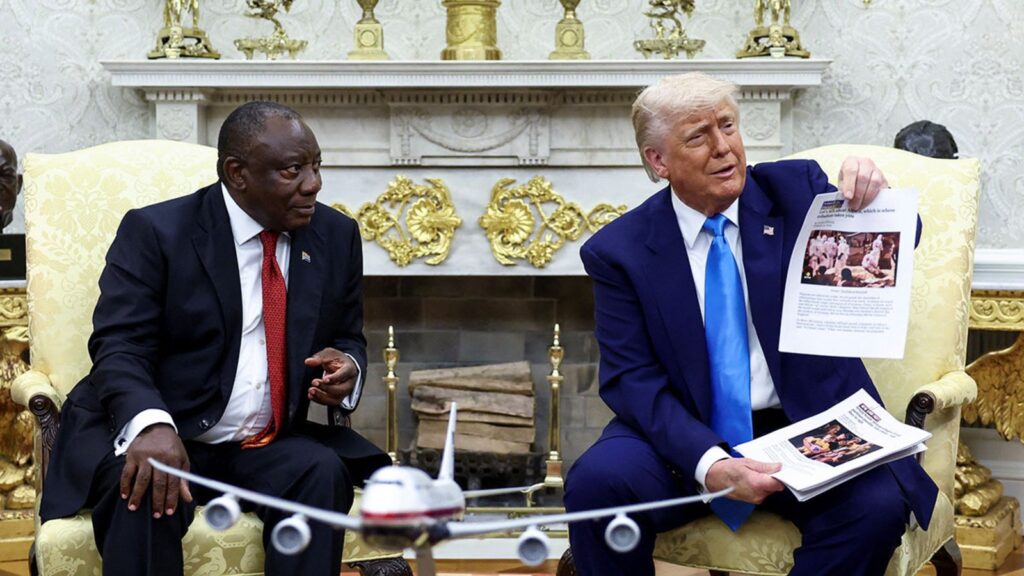Tensions Between South Africa and the Trump Administration Deepen
South Africa is increasingly feeling the strain in its diplomatic relations with the United States, as the Trump administration has adopted a hostile approach towards the nation. This has included blacklisting South African diplomats, shunning high-level meetings, and threatening to impose tariffs that could worsen the country’s economic challenges.
The friction was highlighted recently when the Democratic Alliance (DA), the second-largest party in South Africa’s coalition government, announced that U.S. authorities rejected a diplomatic visa for President Cyril Ramaphosa’s special envoy, Mcebisi Jonas, in May. This refusal directly contravenes Ramaphosa’s efforts to bolster ties with the U.S., especially after Jonas, a well-regarded former deputy finance minister and chairman of mobile company MTN, was designated to mend relations between the two nations.
Ramaphosa’s spokesperson criticized the DA’s claims as “disinformation,” yet did not deny the core of the allegations. The U.S. State Department refrained from commenting on the issue, citing confidentiality regarding visa records.
Recent Developments in U.S.-South Africa Relations
This deteriorating relationship comes on the heels of President Trump’s earlier decisions to halt aid to South Africa, accuse its government of victimizing white citizens, and chastise its diplomatic initiatives involving Israel and Iran. Such actions have only exacerbated existing tensions and fueled a growing estrangement between the two nations.
Priyal Singh, a foreign policy expert from the Institute for Security Studies in Pretoria, noted that the DA’s assertions, if accurate, align with the Trump administration’s strategy to isolate South Africa and impede vital communication channels. As evidence of this, U.S. Treasury Secretary Scott Bessent recently declined to attend a G20 finance ministers meeting hosted in South Africa, opting instead to send a subordinate, indicating a broader withdrawal from collaborative diplomacy.
This disengagement has been visible in other notable absences, such as Secretary of State Marco Rubio, who criticized Ramaphosa’s administration for its alleged anti-American rhetoric and chose to skip a G20 foreign ministers meeting.
| Date | Event | Impact |
|---|---|---|
| May 2025 | U.S. denies visa to Mcebisi Jonas | Further strain on diplomatic relations |
| July 2025 | Scott Bessent skips G20 finance meeting | Signals U.S. disinterest in South Africa’s leadership |
| Ongoing | Possible 30% tariffs on South African goods | Potential for significant job losses and economic fallout |
Amid these challenges, Ramaphosa had hoped for a thaw in relations after meeting Trump in the Oval Office, only to face an awkward confrontation as Trump presented unverified claims of a genocide against white South Africans. This moment underscored the complexities of their diplomatic entangles and revealed the difficulties of restoring trust.
Despite the setbacks, Ramaphosa left the special envoy position vacant instead of appointing another diplomat to navigate this fraught relationship, further suggesting a lack of experienced personnel within the government to address the challenges at hand.
The ramifications of this diplomatic freeze are critical for South Africa, particularly as the prospect of steep U.S. tariffs looms on the horizon with potential enforcement by August 1. Economic analysts warn that the imposition of these tariffs, particularly on the agricultural sector, could lead to the loss of approximately 100,000 jobs in a nation already grappling with an unemployment rate of 32.9%.
As South Africa navigates these tumultuous waters, experts suggest that the country must seek to strengthen ties with other nations, as the Trump administration’s approach indicates that the current impasse is unlikely to be resolved anytime soon.


